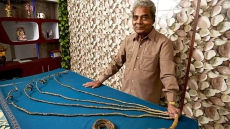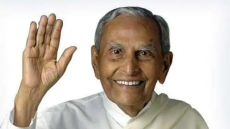Women devotees, who ran “Ready to wait” campaign to support the restriction on entry of women in the age group of 10 to 50 years in Sabarimala Temple in Kerala, on Thursday told the Supreme Court that Lord Ayyappa’s right to privacy as an ‘eternal celibate’ must be respected.
“A deity, having a distinct legal personality, was entitled to the rights under Articles 21, 25 and 26 of the Constitution….Lord Ayyappa’s right to maintain his ‘eternal celibate’ status is covered under the right to privacy under Article 21,” advocate J Sai Deepak told a five-judge Constitution Bench headed by Justice Dipak Misra on behalf of People4Dharma which represents the women devotees of Lord Ayyappa.
A nine-judge Constitution Bench of the Supreme Court had in 2017 declared right to privacy a fundamental right under Article 21 (right to life and liberty).
Article 25 and Article 26 deal with right to religion and right of religious denominations, respectively.
Deepak contended the celibate nature of the deity was integral to the practice which should not be disturbed and whether a particular practice was essential to practise a faith was a question of trial that would require leading evidence for and against.
His arguments were contested by Justice DY Chandrachud who said a practice, even if essential, cannot violate constitutional principles.
Sometimes judges would be required to don the mantle of theologians in deciding issues relating to religion, Deepak responded giving the example of Haji Ali Dargah in Mumbai.
In that case, the Bombay High Court had gone into Hadiths and other Islamic scriptures and recorded evidence to deliver its verdict.
He said it was for those challenging the age-old practice to adduce evidence.
He said Articles 25 and 26 represented a social contract between the nation state and religion as these provisions drew a line for the state.
The entry restriction on women between 10 and 50 years was not based on gender; Deepak said emphasising every exclusion didn’t amount to discrimination.
Senior advocate V Giri – representing the Sabarimala Temple ‘Tantri’ (Priest) – argued that everyone asserting right to religion basically said ‘I believe in the deity’.
“If that is so, their belief must be in sync with the character of the deity which is an essential characteristic of the deity and therefore the religious denomination. The character of the deity cannot be wished away,” Giri submitted.
The Bench also comprising justices RF Nariman, AM Khanwilkar, DY Chandrachud and Indu Malhotra is seized of PILs against the age-old tradition of keeping women of 10-50 years out of the famous Sabarimala Ayyappa temple—one of the holiest Hindu shrines—situated on a hilltop in Kerala.
The tradition is rooted in the belief that the deity is an eternal celibate (Naisthika Brahmachari). The petitioners have challenged Rule 3(b) of the Kerala Hindu Places of Public Worship (Authorization of Entry) Rules, 1965 which restricts entry women between the age of 10 and 50 into the shrine.
On Wednesday, Nair Service Society (NSS) – which represents the Nair community in Kerala – had contested the Supreme Court’s observation that the restriction on entry of women of menstruating age into Sabarimala Temple was due to patriarchy and most women were conditioned to obey it.
Appearing for NSS, senior counsel K Parasaran had rejected the allegation that the restriction on entry of women between the age of 10 and 20 was misogynistic.
“Women in Kerala are socially advanced, owing to their education, and most of them are not opposed to the practices followed in Sabarimala…Hindus in Kerala followed matrilineal practices, and hence it was baseless to contend that they are subjugated. Therefore, the issue should not be approached through notions of patriarchy or misogyny,” Parasaran had said.






